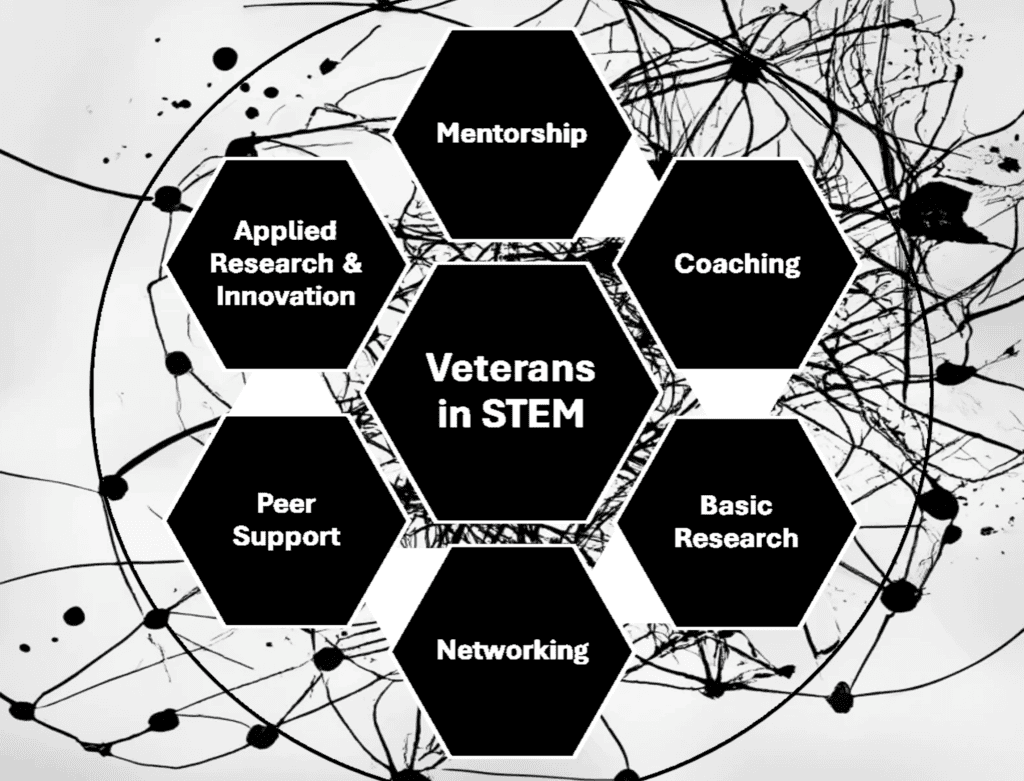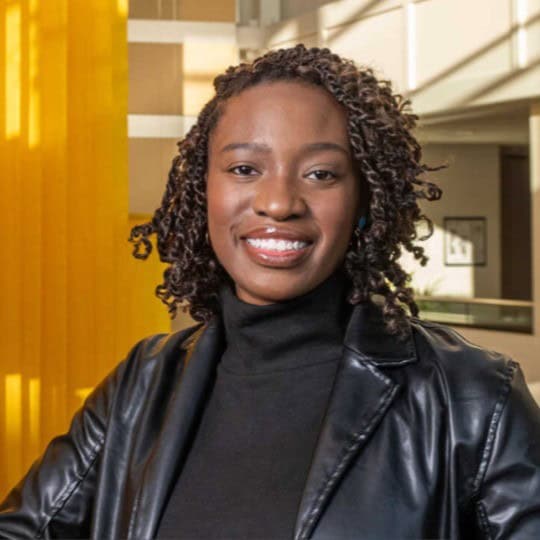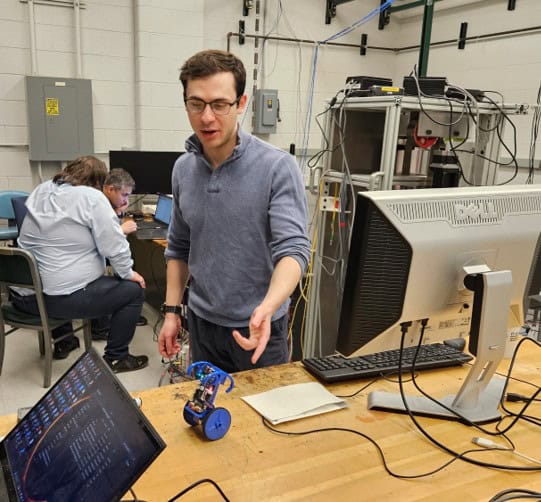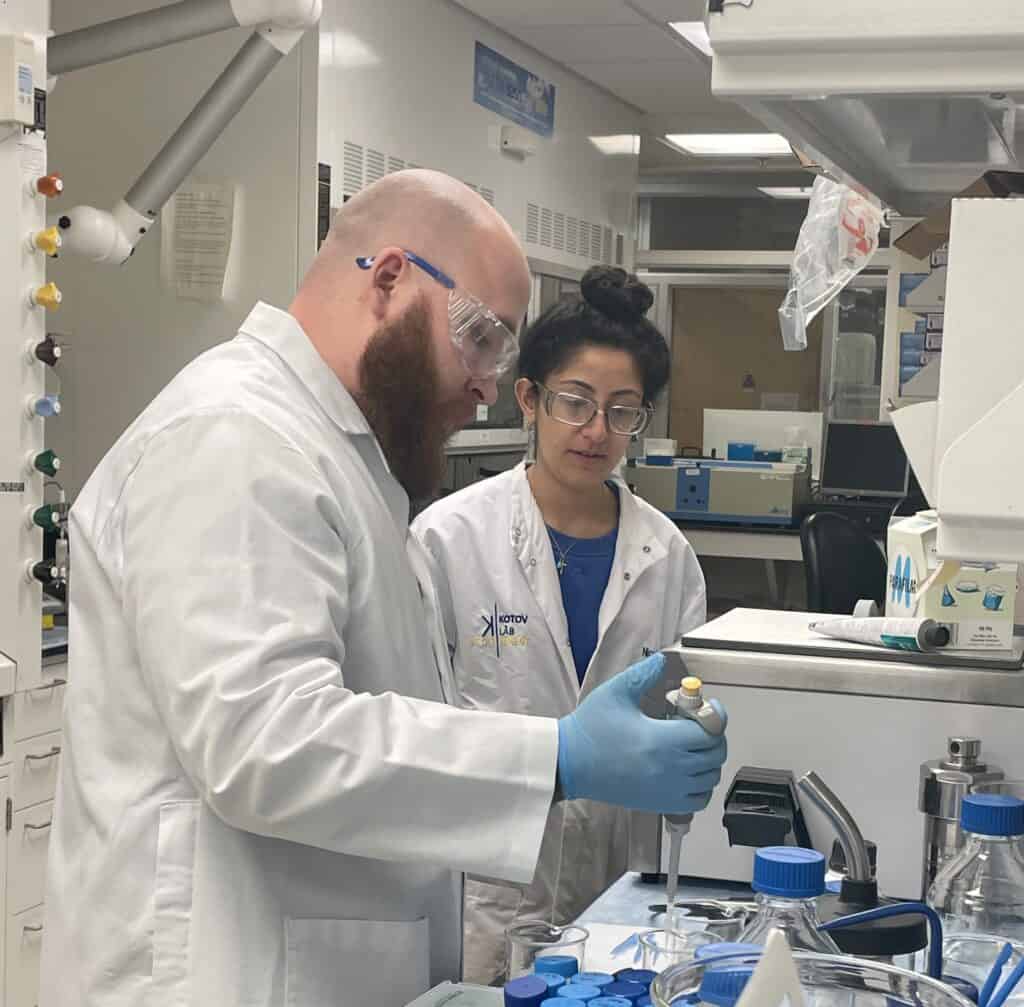
COMPASS launches Veteran Innovation Fellowship Program
The Veteran Innovation Fellowship Program is a first-of-its-kind program centered around providing total support and training to undergraduate veteran students in STEM disciplines.

The Veteran Innovation Fellowship Program is a first-of-its-kind program centered around providing total support and training to undergraduate veteran students in STEM disciplines.
The Center for Complex Particle Systems (COMPASS), directed by Florence V. Cejka Professor of Chemical Engineering Nicholas Kotov, recently launched the Veteran Innovation Fellowship Program (VetIF), a first-of-its-kind program centered around providing total support and training to undergraduate veteran students in STEM disciplines within the center.
COMPASS established the program to address the unique challenges faced by former enlisted veterans in academic and research environments. Jeffery Raymond, COMPASS VetIF and Veterans Program Manager, himself a former enlisted Army infantry soldier and accomplished researcher with a PhD in macromolecular engineering from the University of Michigan, articulated the program’s mission: to provide 360°-mentorship, research experience, financial support, and expert training to undergraduate veteran students.
“U.S. veterans in the student population represent a locus of intersectionality in terms of barriers to academic achievement. Many are non-traditional and first-generation students,” said Raymond. “The motivation for this program is driven by a desire to support prior enlisted student veterans with 360°-mentorship, research experience, considerable financial support, expert training, and incorporation into superior professional networks.”
The 2024 cadre is the first class of Veteran Innovation Fellows to be selected by COMPASS to pursue an undergraduate experience founded in both basic and applied research. The cadre includes four fellows: Olubukola Akinbami, Steven Crechiolo, Brandon Olson, and Jebril Thaxton.
“While we are in our first year of the program, we are so excited to welcome this group of fellows,” Raymond said. “Beyond this first cadre, we’re also looking forward to expanding the program to other universities in the COMPASS network in 2025.”
Olubukola Akinbami, a cognitive science major, is delving into network analysis under the mentorship of distinguished professors from both the University of Michigan and the University of Southern California. Her research aims to model the human brain’s structure, paving the way for predictive interventions in neurological disorders.

“The VetIF program has allowed me to get access to skills, mentoring, experiences, and support that otherwise would not have been available to me. It has left me feeling well positioned to pursue a graduate program in either clinical or non-clinical spaces, while also providing outstanding networking opportunities.”
Olubukola AkinbamiVetIF 2024
“In my former life I was a non-commissioned officer in the U.S. Army contributing to background and security clearance management,” Akinbami said. “The VetIF program has allowed me to get access to skills, mentoring, experiences, and support that otherwise would not have been available to me. It has left me feeling well positioned to pursue a graduate program in either clinical or non-clinical spaces, while also providing outstanding networking opportunities.”
Steven Crechiolo, a former Marine Corps member, is charting new frontiers in aerospace research within the Cesnik Laboratory.

“The VetIF program allows me to bridge the gap between academic pursuits and my basic needs by providing me with financial support, research skills, and an outstanding community of mentors. As a first-generation and non-traditional student, the program allows me to fully engage in an environment that I otherwise may struggle in.”
Steven CrechioloVetIF 2024
“The VetIF program allows me to bridge the gap between academic pursuits and my basic needs by providing me with financial support, research skills, and an outstanding community of mentors,” Crechiolo said. “As a first-generation and non-traditional student, the program allows me to fully engage in an environment that I otherwise may struggle in.”
His journey from military service to academia is a testament to his resilience and determination to contribute to scientific progress, and as part of the fellowship, he will develop skills in complex system modeling and prediction as well as nano- and micro-scale imaging.
Brandon Olson, a neuroscience major and former Marine air traffic controller, is immersing himself in the realm of biomimicry under the guidance of Nicholas Kotov synthesizing chiral carbon nanomolecular particles. This work builds a foundation for continued research of the medical applications of these systems.
Before coming to the University of Michigan, Olson was a Marine air traffic controller for 9 years. In that time, he completed an associate of science degree and paramedic certification.

“The veteran’s innovation fellowship has had a profound impact on not only my success as a student, but also on my entire career trajectory. Before the fellowship I experienced financial hardship, insufficient mentorship with my goals in mind, lack of research opportunities, and high levels of stress in most aspects of my life. This experience has remedied my biggest hardships and at the same time challenges me to achieve more.”
Brandon OlsonVetIF 2024
“The veteran’s innovation fellowship has had a profound impact on not only my success as a student, but also on my entire career trajectory,” Olson said. “Before the fellowship I experienced financial hardship, insufficient mentorship with my goals in mind, lack of research opportunities, and high levels of stress in most aspects of my life. This experience has remedied my biggest hardships and at the same time challenges me to achieve more.”
Jebril Thaxton, a Navy veteran and electrical engineering major, is exploring nanoscale materials in the Laboratory of Emergent and Galvanically Orchestrated Systems (LEGOS) Lab under the guidance of Chemical Engineering Assistant Professor Albert Liu and Martin Thuo from North Carolina State University.
Thaxton grew up in the Metro Detroit Area and served four years in the U.S. Navy as a nuclear plant operator onboard the U.S.S. Theodore Roosevelt. Upon graduation, he plans to pursue a PhD in electrical engineering, with a research goal of contributing to the future of optical and photonic materials.

“This fellowship is putting me in the best position to succeed in graduate school and beyond, by helping me gain a deeper understanding of my research interests, strengths, and areas for improvement. I am very excited to be working with Professors Albert Liu and Martin Thuo on next-generation material systems.”
Jebril ThaxtonVetIF 2024
“This fellowship is putting me in the best position to succeed in graduate school and beyond, by helping me gain a deeper understanding of my research interests, strengths, and areas for improvement,” Thaxton said. “I am very excited to be working with Professors Albert Liu and Martin Thuo on next-generation material systems.”
Beyond their individual pursuits, these fellows converge bi-weekly as a cadre, providing mutual support and intellectual exchange. Their journey is not solitary but shared, characterized by camaraderie and collaboration.
Looking ahead, COMPASS envisions expanding the program to other universities within its network, amplifying its impact and reach. With the support of industry partners and a growing community of veteran scholars, the program will be expanded with fellows joining from North Carolina State University and the University of Illinois at Urbana Champagne.
The NSF Center for Complex Particle Systems (COMPASS) will soon be inviting applications for the VetIF 2025 cadre. This fellowship provides training in the emerging field of complex systems applied to materials science, hands-on laboratory research experience, extensive mentorship, industry and academic networking, and exceptional financial support.
Questions about supporting VetIF, or applying for a fellowship can be sent to Jefferey Raymond.